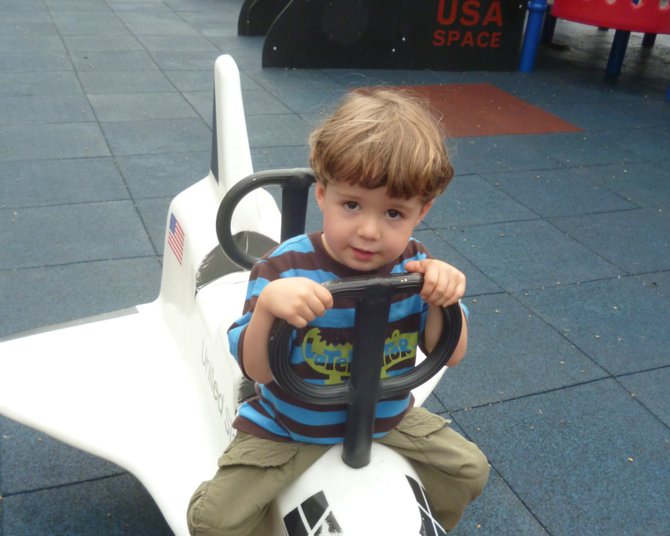Steer your child toward a happy, healthy future with positive discipline. Photo by Kathleen M. Mitchell.
It is a truth almost universally acknowledged that everyone is a better parent before they have kids. And then that amazing, tiny, fragile little person comes into the world, steals your heart and poops right in your face during one of his first diaper changes. (Or maybe that was just mine.)
It is impossible to fully prepare for parenthood. Reading is a far cry from doing; you don't really know what you will be like as a parent until you are one. Suddenly, the way you were raised, the well-meaning advice of friends with and without kids, and the seemingly clear-cut rules of the parenting books don't always make sense for you, your child or your family.
One of the main parenting priorities that I practice with my 3-year-old son is positive and respectful discipline. It makes no logical sense to me to hit a child to teach them not to hit others--to lose it with a child while trying to teach them to control themselves. Physical punishment is fairly common in Mississippi. However, the latest research continues to show that spanking and other forms of corporal punishment are harmful to children--physically, emotionally and even intellectually. That's right. Experts believe spanking can lower your kid's IQ. Just ask scientists at the University of New Hampshire and Duke University.
Don't get me wrong, I am not going to say that parenting is easy. I am certainly not going to say that positive discipline is easy, because it isn't. There are times when all of us as parents are short on sleep, short on time, short on money, short on support and short on patience. But regardless of your circumstances, raising a child who is respectful, responsible, empathetic and independent is worth every moment of your patience and understanding.
Positive Discipline Tips to Encourage Good Behavior
• Make sure that everyone in your home--including you--is getting enough sleep, healthy food to eat and time to exercise.
• Give your children love and attention first thing in the morning. Get the day off to a good start by being fully engaged with your kids when they wake up. Investing even 15 minutes of positive attention before school can make a huge difference in behavior for the rest of the day.
• Moderate your own expectations of your children's behavior to be developmentally appropriate and realistic for their age and stage.
• Praise positive behaviors.
• Keep a fairly consistent routine--and don't expect your child to behave in an angelic manner in a long grocery line at naptime. Help yourself by helping them stick to the routine as much as possible.
• Help your kids learn to express their feelings in a positive way, and pay attention to what they are showing or telling you. Validate their feelings even if you disagree with their actions.
• Model effective problem solving in your own life, and then let your kids try to solve their problems independently before offering assistance.
• Say yes as much as possible, even if you are saying yes to a modified version of your kid's desire at a later time: "Yes, you may play with James tomorrow." "Yes, you may have one cookie after dinner."
• Help your kids learn to use their words. Use calm, patient, gentle words with your kids, or wait to respond until you are ready to do so.
• Don't sweat the small stuff. Focus on disciplining the most urgent behavior problems and ignore smaller annoyances. Again, praise and reward the behavior you like.
• Give a verbal warning before disciplining. State what the consequence will be if the behavior continues. Use a logical consequence. If your child keeps throwing the ball at your head, for example, tell her that you will put the ball away the next time it happens. Follow through.
• Don't act in anger. Don't discipline in anger. Pause to decide on your response before following through. Stay calm, and do not escalate the situation. Remember that you are the adult.
• Get down to your child's eye level to communicate. Speak clearly in a calm voice.
• If all else fails, turn on some music or take the kids outside. A change of mood or a change of scenery can work miracles.
• Get down to your child's eye level to communicate. Speak clearly in a calm voice.
• If all else fails, turn on some music or take the kids outside. A change of mood or a change of scenery can work miracles.
Positive Parenting Resources
"Positive Discipline from A to Z," by Jane Nelson (Three Rivers Press, 2007, $16.99)
"The Discipline Book: How to Have a Better-Behaved Child from Birth to Age Ten," by Dr. William Sears and Martha Sears (Little, Brown, 1995, $14.99)
"How to Talk So Kids Will Listen and Listen So Kids Will Talk," by Adele Faber and Elaine Mazlish (Scribner, 2012, $16)
"Playful Parenting," by Lawrence Cohen (Ballantine Books, 2002, $14.95)
"Wild Things: The Art of Nurturing Boys," by Stephen James and David Thomas (Tyndale House Publishers, 2009, $14.99)
Positive Picture Books
"Hands are Not For Hitting," by Martine Agassi (Free Spirit Publishing, 2009, $11.95)
"When I Feel Angry," by Cornelia Maude Spelman (Albert Whitman & Company, 2000, $6.99)
"I Just Don't Like the Sound of No!," by Julia Cook (Boys Town Press, 2011, $10.95)
"Calm Down Time," by Elizabeth Verdick (Free Spirit Publishing, 2010, $7.95)



Comments
Use the comment form below to begin a discussion about this content.
comments powered by Disqus